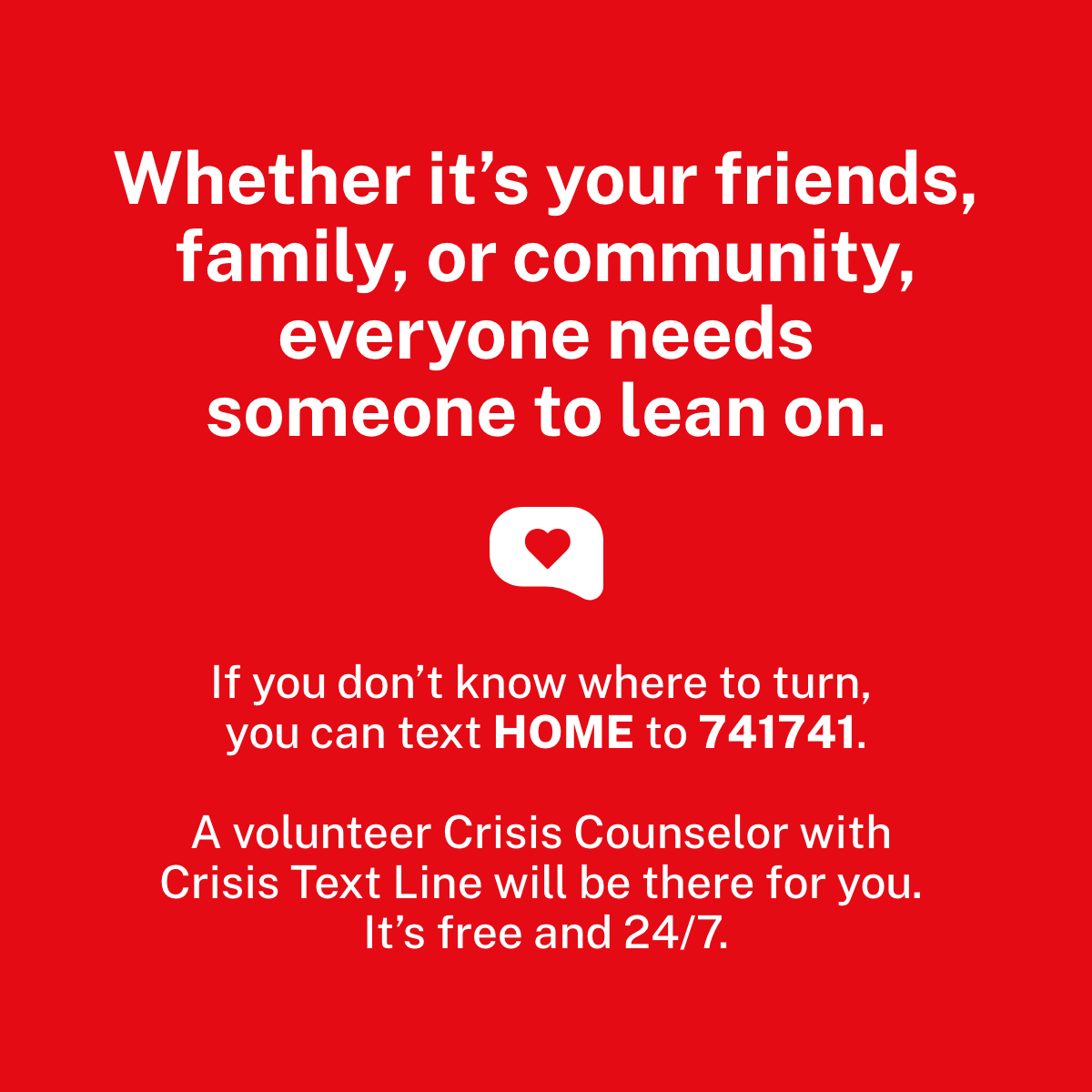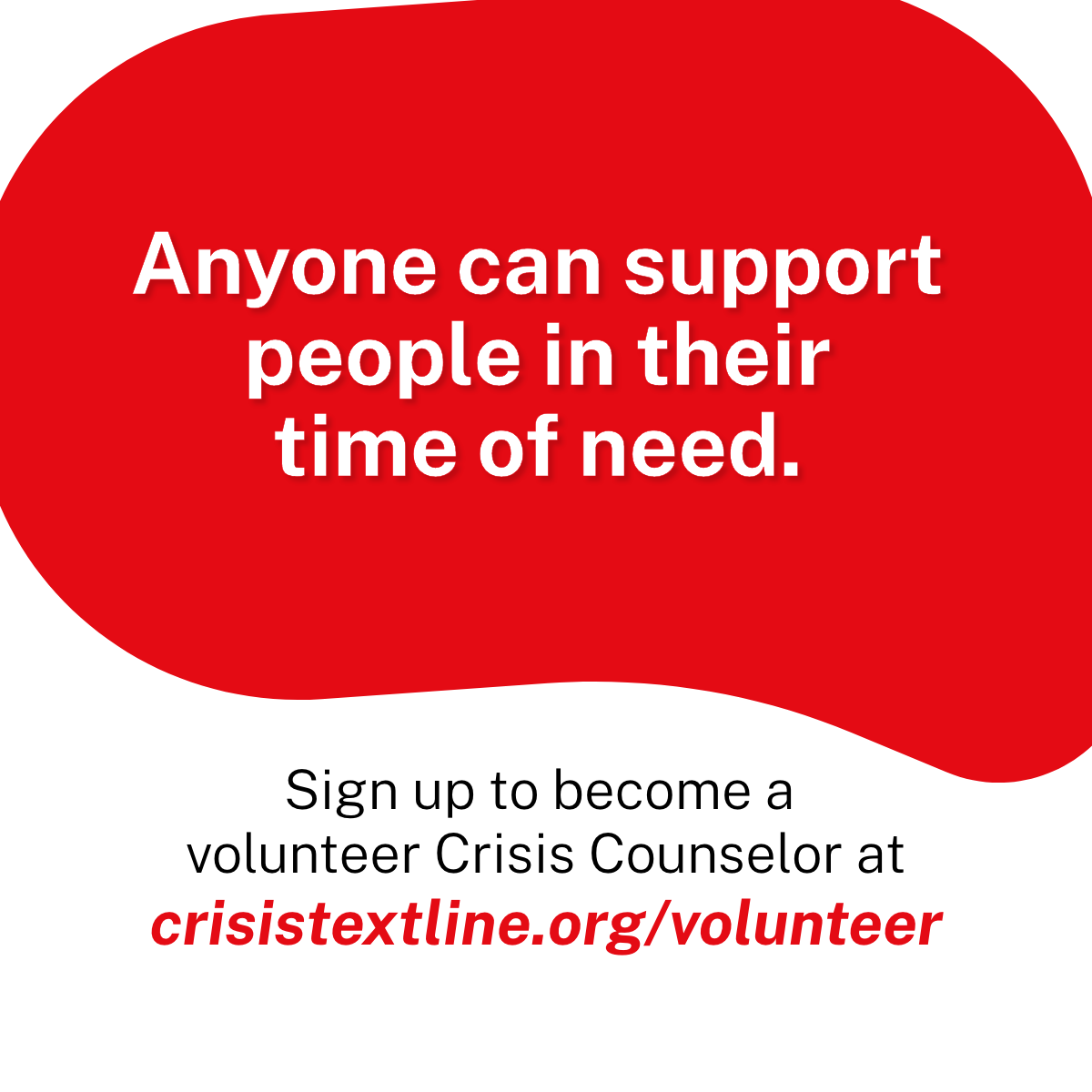Loneliness


How to Overcome Loneliness
Text CONNECT to 741741 for free, confidential support from a trained volunteer Crisis Counselor, available 24/7.
Feeling lonely is more common than you might think. When loneliness persists, it can have a serious impact on your mental health. We’re here to listen. Text CONNECT to 741741 anytime for free, 24/7, confidential support.
What is loneliness? #
Loneliness is a distressing emotional state characterized by a deep sense of social isolation and lack of connection with others. It’s something many people experience. Maybe you didn’t get invited to an eventor maybe you’re feeling down and unsure who to turn to.
The U.S. Surgeon General recently stated that we are in the middle of a loneliness epidemic as “one-in-two adults in America reported experiencing loneliness.” Increased social isolation—driven in part by technology and social media—has limited opportunities for meaningful connections.
But you’re not alone in feeling this way. In fact, our fourth annual United in Empathy report states that 1 in 5 texters who reached out to our text line spoke about suffering from the lack of human connection. This shared experience reminds us how important it is to build community and meaningful relationships. Together, we can take steps to reduce loneliness and its impact.
Do you feel like you have no one to talk to? #
When you’re faced with the overwhelming feeling of having no one to talk to, there are still ways to find support. Here are some options:
- We, at Crisis Text Line, offer free, 24/7, confidential support. Simply text CONNECT to 741741 to chat instantly with a live, trained volunteer Crisis Counselor.
- Explore online communities, support groups, or forums to connect with others facing similar challenges.
- Therapy is another option—whether individual or group-based—is a way to find connection, guidance, and understanding.
Remember, even in moments of profound loneliness, there are resources available to ensure you’re not facing your struggles alone.
Check out 5 Loneliness Quotes That Will Make You Feel Less Alone →
Signs and Symptoms of Loneliness #
Pinpointing loneliness can be challenging because it often overlaps with other mental health concerns, like depression and anxiety. Feelings of loneliness can amplify sadness, hopelessness, and anxiety, creating a cycle of isolation that’s hard to break.
Physical Symptoms of Loneliness:
- Low energy or brain fog
- Sleep problems, including difficulty with falling asleep or staying asleep
- Lack of appetite
- Getting sick more often
- Physical discomfort and pains including headaches, migraines, stomachaches, or muscle tension
Signs of Loneliness:
- Hopeless, worthlessness, or depressive feelings
- Increased anxiety
- Overspending or attachment to material things
- Drinking more alcohol or using drugs
- Binge-watching TV excessively
- Over-reliance on social media
Types of Loneliness
Loneliness comes in different forms, such as: situational, developmental, and internal.
- Situational loneliness happens after life changes, like moving away from friends and family or starting a new school or job.
- Developmental loneliness occurs when you feel like you’re falling behind in life compared to your peers, leading to feelings of isolation.
- Internal loneliness is a perceived feeling of being alone in any and every situation, even when surrounded by people.
Recognizing the type of loneliness you or someone you know may be experiencing can help you better understand and address the feelings and find the right support. Remember, seeking help is a strength—not a weakness.
Loneliness can manifest in various situations and stages of life, affecting individuals across different demographics. The following are a number of common situations that can lead to loneliness:
Loneliness and work from home: With the shift to remote work, many individuals experience loneliness due to the lack of in-person social interactions, reduced opportunities for spontaneous conversations, and the blurring of boundaries between work and personal life, which can lead to feelings of isolation and disconnection from colleagues and peers.
Loneliness in college: College students often experience loneliness due to the significant life transition of leaving home, adapting to a new environment, and the challenges of making new friends and establishing social connections in a competitive and demanding academic setting.
Teenage loneliness: Teenagers may struggle with loneliness as they navigate the complexities of adolescence, dealing with issues like peer pressure, social insecurities, and a search for identity. Factors such as bullying, exclusion, and the pressure to fit in can contribute to feelings of isolation.
Elderly people and loneliness: Elderly individuals are particularly susceptible to loneliness due to factors like retirement, loss of loved ones, health issues, and reduced social interactions. The absence of regular social activities and support networks can lead to a sense of isolation, impacting their mental and physical well-being.
Loneliness in a relationship: Despite being in a partnership, individuals can experience loneliness within a relationship when emotional or physical needs aren’t adequately met, communication breaks down, or a sense of emotional disconnection persists, leaving one or both partners feeling alone and unfulfilled.
Loneliness after a breakup: Following a breakup, individuals often experience a profound sense of loneliness and grief as the loss of a romantic relationship can leave a void in their lives, disrupting the social support and companionship they once relied on.
Loneliness after divorce: Divorce can trigger intense feelings of loneliness as individuals face the dissolution of their marriage and the accompanying changes in their social dynamics, often resulting in the loss of shared friendships, routines, and support systems that were once integral to their lives.
Loneliness and social media: The rise of social media has paradoxically contributed to loneliness as people compare themselves to idealized versions of others’ lives, experience fear of missing out (FOMO,) or communicate via superficial online interactions that don’t fulfill their need for deep and meaningful connections.
Common Causes of Loneliness #
Loneliness can arise for many reasons. Think about whether any of these changes have occurred in your life recently, you:
- Spent too much time on social media
- Moved away from close friends or family
- Lost a friend or loved one
- Transitioned to living alone
- Struggled to meet new people due to access or confidence issues
- Experienced health challenges
- Avoided social situations because you fear being rejected
- Retired or left a job
- Experienced culture shock, such as by moving to a new country where others don’t speak your native language
- Located or currently live in an area that is geographically cut-off from the rest of the world
Effects of Loneliness #
Loneliness is a complex emotional experience that can significantly impact mental health. According to the U.S. Surgeon General’s Loneliness Epidemic advisory, research has linked loneliness to variousmental health challenges s, such as depression, anxiety, and an increased risk of suicidal thoughts. When not addressed, loneliness can deepen these struggles, creating a cycle of emotional distress and further isolation.
Can loneliness lead to depression?
Yes, loneliness and depression are deeply interconnected , often intensifying one another. Loneliness can cause feelings of sadness and hopelessness, which can easily spiral into depression. On the other hand, depression can also cause social isolation, making it harder for individuals to connect with others and breaking down existing relationships.
Is there a link between loneliness and suicide?
Loneliness is a significant risk factor for suicide, particularly among young people. The feelings of isolation and disconnection that come with loneliness can make individuals feel hopeless and without support. For those struggling with mental health issues, loneliness can exacerbate suicidal thoughts and increase the risk of acting on those thoughts.
How does anxiety contribute to loneliness?
Anxiety and loneliness often reinforce each other in a detrimental cycle. When individuals feel socially isolated, they may begin to worry excessively about social situations, making it harder for them to form new relationships or engage with others. This anxiety can then perpetuate feelings of loneliness, creating a negative cycle.
How to Manage Loneliness #
Overcoming loneliness isn’t easy, but it’s possible with intentional steps and support! If you’re struggling with feelings of isolation, remember you’re not alone and there are ways to connect and find relief. If you need someone to talk to, text CONNECT to 741741 to reach a live volunteer Crisis Counselor. You can also find help for loneliness by trying out some of the following:
- Reach out to friends and family: Modern technology makes it easier than ever to connect with loved ones, no matter the distance. Try sending a text message to the special people in your life, just to let them know they’re on your mind. Here’s a start: “Hey, I’ve been missing you lately. How are you?” This is an excellent way to deal with isolation and loneliness.
- Engage with your surroundings: Start interacting with the people you see in your daily life. Maybe the barista at your local coffee shop who makes you the perfect cup of joe every single day. Or maybe the crossing guard who keeps you safe on your way to school or work. Who knows? A friendly “hello” could brighten your day and theirs.
- Find a community: According to the National Alliance on Mental Illness (NAMI), finding a community connection can be pivotal for mental wellness. These days, there are groups for everything. Try a new workout class, start a trivia group, or make a standing brunch date with people you want to prioritize in your life. Not sure who your people are or where to find them? Search Meetup.com to find other people who share those interests in your area.
- Consider getting a pet: If your lifestyle permits, getting a pet is an excellent way to help with loneliness. Pets can decrease stress and mitigate symptoms of anxiety. Use your furry pal as an opportunity to meet other pet owners by visiting a cat café or dog park. If you’re not able to get a pet, you can also volunteer at your local pet shelter or look for dog-walking opportunities as a way to maximize your time with animals and give back to the community.
How to Help Someone Who is Lonely #
If you believe someone is experiencing loneliness, there are several ways you can offer support and help alleviate their feelings of isolation:
- Be present and listen: Actively listening to someone without judgement can provide immense comfort. Create a safe space where they can express their thoughts and emotions openly. Show genuine interest in their experiences and validate their feelings.
- Have you ever heard someone say: “You might be hearing me, but you’re not listening to me”? This is what you do not want someone who is feeling lonely to say. Actively listening will require purpose, effort and curiosity. An active listener attempts to internalize and understand what they are hearing to connect with the other person and participate in a meaningful conversation. Passive listening is listening that is characterized as being disconnected, inattentive, and unreceptive.
- Offer companionship: Spend quality time with them and engage in activities together. Plan outings, invite them for a walk or a coffee, or simply spend time in a fun conversation. Human connection and shared experiences can go a long way in combating loneliness.
- Encourage involvement: Encourage the person to participate in social activities or join clubs, groups, or organizations that align with their interests. This can provide opportunities for them to meet new people and expand their social network.
- Share helpful resources: Share information about local support groups, community events, or organizations that promote social connections and provide a sense of belonging. Encourage them to seek professional support services or counseling if needed.
- Be patient and understanding: Understand that overcoming loneliness takes time and that everyone’s journey is unique. Offer patience, empathy, and support throughout the process.
More ways to help someone who feels lonely →
Additionally, if someone is in crisis or needs immediate assistance, it’s important to provide them with resources such as helplines. Crisis Text Line offers confidential support at all times of the day or night. We’re just a text message away! Text CONNECT to 741741.
Spread the Word – Provide 741741 to a Friend #
You never know who might need Crisis Text Line. Pass it on and tell the people in your life to text CONNECT to 741741 if they’re ever in crisis, big or small.



Looking to make an impact? You can help change and save lives, one text at a time.
Volunteer Virtually at Crisis Text Line

